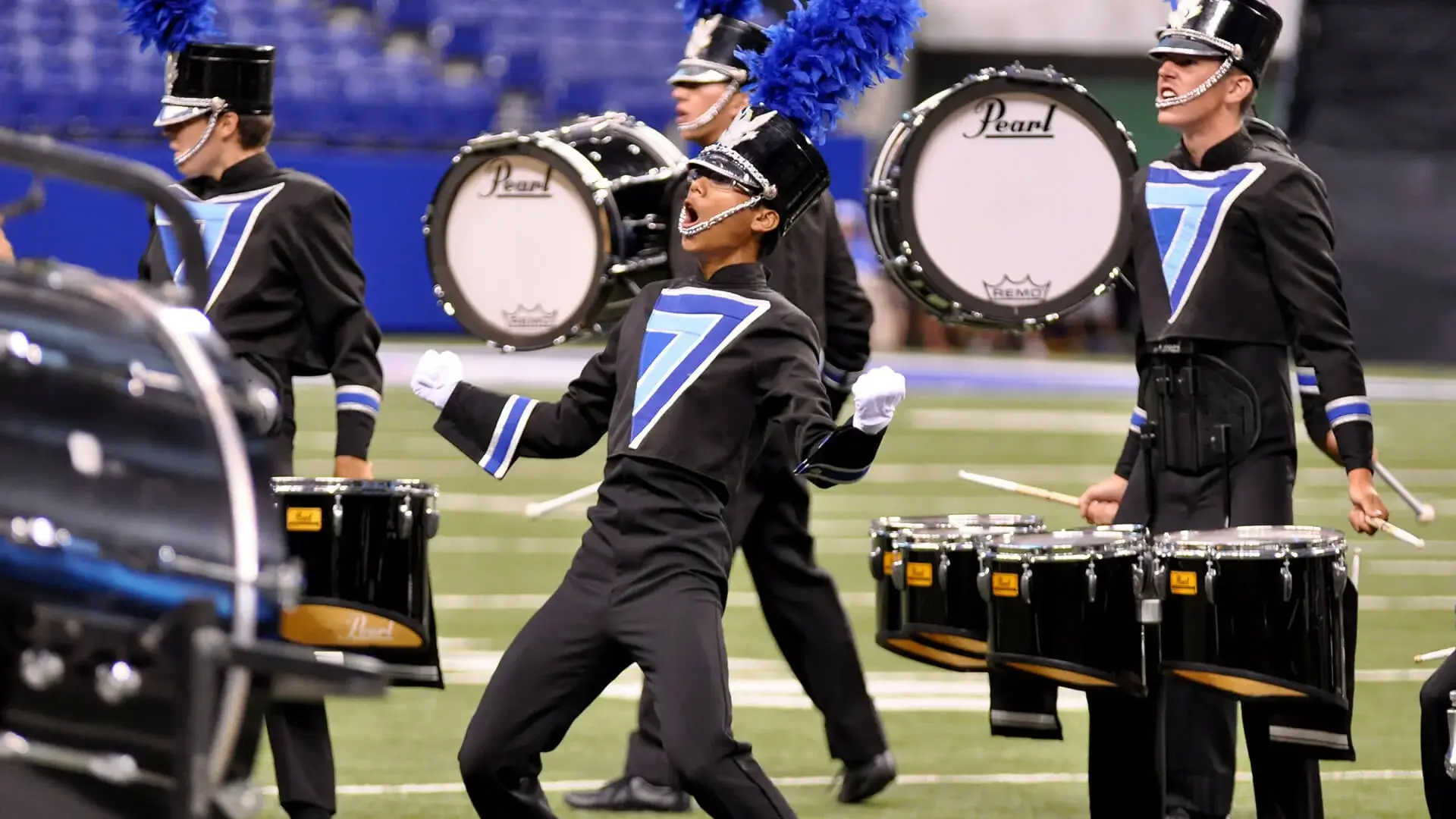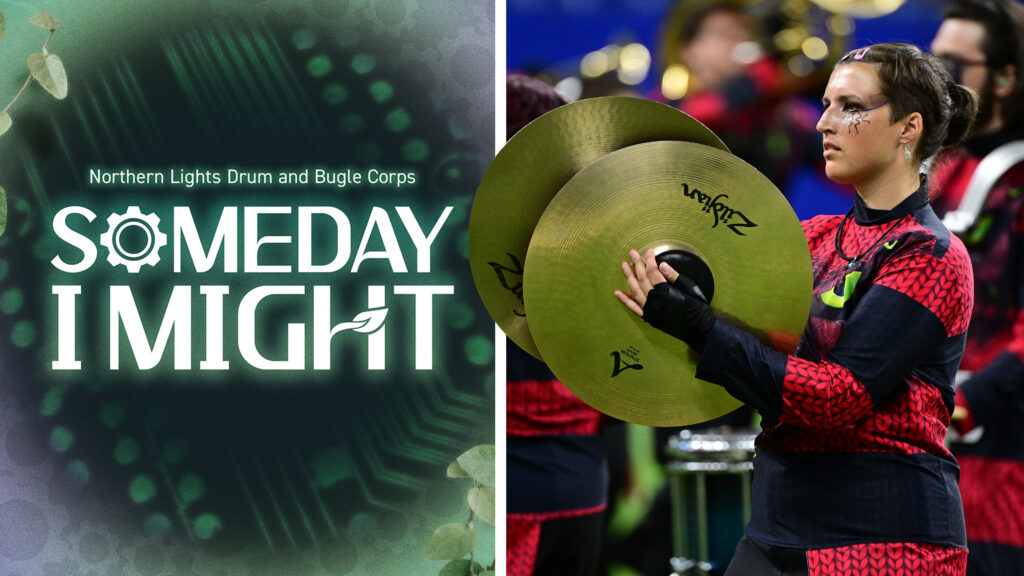Drum Corps International celebrated its 40th anniversary in 2012, kicking off the festivities with the Open Class World Championship in Michigan City, Indiana.
Oregon Crusaders won the Open Class title while capturing the caption awards for Best General Effect, Best Visual Performance, and Best Brass Performance. Blue Devils B placed second with Best Percussion, and the third-place Vanguard Cadets, despite winning no awards, finished only a tenth away from second place with a production honoring the tradition of the organization’s Aussie-style hat. The one remaining caption award went to the fourth-place Spartans’ color guard.
7th Regiment finished 2012 in fifth place with the corps’ highest placement to date. The show, “24601-7R,” was titled after the prisoner number of Jean Valjean, the escapee from the musical “Les Misérables,” though no music was played from that production.

Rather, the show focused on the dystopian view of an oppressive society that attempts to control the thoughts and actions of its citizens. Its inspiration came from films such as “Gattaca” and “The Matrix” and sci-fi novels such as “Fahrenheit 451.” The Valjean character was referenced to convey how an innocent person could be physically and emotionally imprisoned by such a societal system or government.
In 7th Regiment’s production, the corps members became the cast of the production; having been led by their overlords to believe that the wretched conditions they must endure was in their best interest. This nanny state storyline was set up from the very beginning, when a mellophone player wasn’t behaving in a manner akin to the rest of the corps. The drum major scolded her for not following the party line, and from then on, the audience was directed to look to examples of others trying to break the mode, to, in effect, unplug from the matrix of oppression in order to attempt to preserve the hope that the individual might somehow rise above the restraints from above.
Throughout the show, whenever anyone touched a shako lying on the ground, they were trying to unplug from the matrix. It became clear that the shakos were symbols of the oppression of those in charge, a reminder of the policies intended to keep everyone in line.

Music started with the ostinato repetitive figure from “Symphony No. 7, Mvt. 2 (Allegretto)” of Ludwig van Beethoven, written in 1811. The movement was so well received at the symphony’s premiere that it was encored upon the work’s conclusion. The reserved nature of the piece provided a subtle hint that although things seemed normal, there was possibly a disturbance in the near future.
In J.J. Abrams’ 2009 film “Star Trek,” Michael Giacchino’s “Enterprising Young Men” introduced the USS Enterprise and was also used as background music to the run of the main title. During this piece, individual 7th Regiment members started tossing off their shakos and parts of their uniforms to bravely express their individuality.
“Ára Bátur (Be Here Now)” is a ballad written and performed by the members of Sigur Rós, an Icelandic post-rock band that was founded in 1994. Post-rock is a form of experimental rock blending many elements of relatively obscure rock genres. The music is typically instrumental; though vocals are utilized often as another musical voice, not unlike scat music in the vocal jazz idiom. The song served as a reflection of hope as expressed by the corps’ color guard section, whose members had transitioned from bright orange flags of the prior movement’s intensity to more visually relaxing gentle sky blue flags.

Brian Balmages’ “Fire” is the fourth and final movement from “Elements (Petite Symphony),” a four-movement work written in 2010 for school bands. This provided the background for the battle scene where the color guard members brandished their rifles in armed rebellion. As tensions boiled over, the horns and drums, all in the same uniform to represent those who had already succumbed to the oppressors, took on the guard members, who were individually dressed in varying costumes. The drum major, the ultimate symbol of authority in any corps, put an end to one of the guard members, who collapsed up front and remained on the field for quite some time.
“Finale from Symphony 2” of Jean Sibelius was written by the Finnish composer in 1902, the symphony described by the composer as, “a confession of my soul.” The piece served as the show’s closer due to its optimistic nature. Robert Kajanus, who conducted the work’s first recording in 1930, wrote that the movement “develops toward a triumphant conclusion intended to rouse in the listener a picture of lighter and confident prospects for the future.” Guard members picked up their fallen comrade and the rest of the performers cast off their shakos, joining in the effort that overthrew the forces of evil through unity rather than battle.
Corps members continued to throw off their shakos one-by-one as the brightening flags demonstrated the controlling authorities no longer had the members pinned under their oppressive thumbs. Rays of hope led all out of the darkness into a brighter future of freedom.
For this week only, you can save on the DVD that contains this complete 7th Regiment performance.
https://store.dci.org/collections/audio-video/products/dcirnv8065-2012-world-championships-dvd-vol-1 (Available 30% off for a limited time only.)

Michael Boo was a member of the Cavaliers from 1975-1977. He has written about the drum corps activity for more than 35 years and serves as a staff writer for various Drum Corps International projects. Boo has written for numerous other publications and has published an honors-winning book on the history of figure skating. As an accomplished composer, Boo holds a bachelor’s degree in music education and a master’s degree in music theory and composition. He resides in Chesterton, Indiana.





